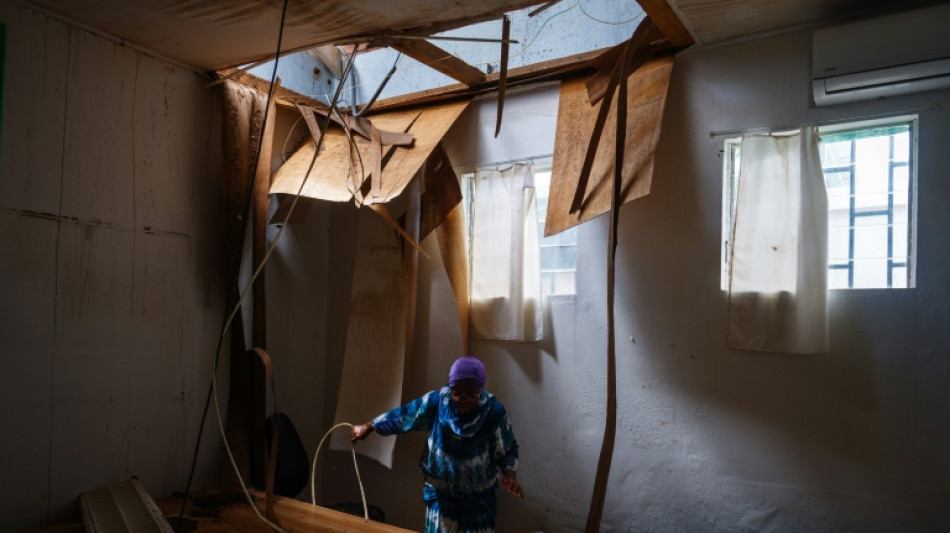
-
 Chinese ship linked to severed Baltic Sea cables sets sail
Chinese ship linked to severed Baltic Sea cables sets sail
-
Sorrow and fury in German town after Christmas market attack

-
 Guardiola vows Man City will regain confidence 'sooner or later' after another defeat
Guardiola vows Man City will regain confidence 'sooner or later' after another defeat
-
Ukraine drone hits Russian high-rise 1,000km from frontline

-
 Villa beat Man City to deepen Guardiola's pain
Villa beat Man City to deepen Guardiola's pain
-
'Perfect start' for ski great Vonn on World Cup return

-
 Germany mourns five killed, hundreds wounded in Christmas market attack
Germany mourns five killed, hundreds wounded in Christmas market attack
-
Odermatt soars to Val Gardena downhill win

-
 Mbappe's adaptation period over: Real Madrid's Ancelotti
Mbappe's adaptation period over: Real Madrid's Ancelotti
-
France's most powerful nuclear reactor finally comes on stream

-
 Ski great Vonn finishes 14th on World Cup return
Ski great Vonn finishes 14th on World Cup return
-
Scholz visits site of deadly Christmas market attack

-
 Heavyweight foes Usyk, Fury set for titanic rematch
Heavyweight foes Usyk, Fury set for titanic rematch
-
Drone attack hits Russian city 1,000km from Ukraine frontier

-
 Former England winger Eastham dies aged 88
Former England winger Eastham dies aged 88
-
Pakistan Taliban claim raid killing 16 soldiers

-
 Pakistan military courts convict 25 of pro-Khan unrest
Pakistan military courts convict 25 of pro-Khan unrest
-
US Congress passes bill to avert shutdown

-
 Sierra Leone student tackles toxic air pollution
Sierra Leone student tackles toxic air pollution
-
German leader to visit site of deadly Christmas market attack

-
 16 injured after Israel hit by Yemen-launched 'projectile'
16 injured after Israel hit by Yemen-launched 'projectile'
-
Google counters bid by US to force sale of Chrome

-
 Russia says Kursk strike kills 5 after Moscow claims deadly Kyiv attack
Russia says Kursk strike kills 5 after Moscow claims deadly Kyiv attack
-
Cavaliers cruise past Bucks, Embiid shines in Sixers win

-
 US President Biden authorizes $571 million in military aid to Taiwan
US President Biden authorizes $571 million in military aid to Taiwan
-
Arahmaiani: the Indonesian artist with a thousand lives

-
 Indonesians embrace return of plundered treasure from the Dutch
Indonesians embrace return of plundered treasure from the Dutch
-
Qualcomm scores key win in licensing dispute with Arm

-
 Scientists observe 'negative time' in quantum experiments
Scientists observe 'negative time' in quantum experiments
-
US approves first drug treatment for sleep apnea

-
 US drops bounty for Syria's new leader after Damascus meeting
US drops bounty for Syria's new leader after Damascus meeting
-
Saudi man arrested after deadly car attack on German Christmas market

-
 'Torn from my side': horror of German Christmas market attack
'Torn from my side': horror of German Christmas market attack
-
Bayern Munich rout Leipzig on sombre night in Germany

-
 Tiger in family golf event but has 'long way' before PGA return
Tiger in family golf event but has 'long way' before PGA return
-
Pogba wants to 'turn page' after brother sentenced in extortion case

-
 Court rules against El Salvador in controversial abortion case
Court rules against El Salvador in controversial abortion case
-
French court hands down heavy sentences in teacher beheading trial

-
 Israel army says troops shot Syrian protester in leg
Israel army says troops shot Syrian protester in leg
-
Tien sets-up all-American NextGen semi-final duel

-
 Bulked-up Fury promises 'war' in Usyk rematch
Bulked-up Fury promises 'war' in Usyk rematch
-
Major reshuffle as Trudeau faces party pressure, Trump taunts

-
 Reggaeton star Daddy Yankee in court, says wife embezzled $100 mn
Reggaeton star Daddy Yankee in court, says wife embezzled $100 mn
-
Injured Eze out of Palace's clash with Arsenal

-
 Norway's Deila named coach of MLS Atlanta United
Norway's Deila named coach of MLS Atlanta United
-
Inter-American Court rules Colombia drilling violated native rights

-
 Amazon expects no disruptions as US strike goes into 2nd day
Amazon expects no disruptions as US strike goes into 2nd day
-
Man Utd 'more in control' under Amorim says Iraola

-
 Emery insists Guardiola 'still the best' despite Man City slump
Emery insists Guardiola 'still the best' despite Man City slump
-
US confirms billions in chips funds to Samsung, Texas Instruments


Mayotte hospital on life support after cyclone
The haggard faces in the wreckage-and-water-strewn corridors betrayed the nerves and exhaustion of those soldiering on at the main hospital on the French archipelago of Mayotte, ravaged by a deadly cyclone last weekend.
"It's chaos," summed up medical and administrative assistant Anrifia Ali Hamadi.
"The roof is collapsing. We're not very safe. Even I don't feel safe here."
Perched on a cliffside overhanging the capital Mamoudzou, the hospital offers a fine vantage point from which to view the vast wreckage Cyclone Chido wrought when it barrelled into the French Indian Ocean territory.
Despite its blown-out windows and doors ripped off their hinges, most of the hospital's medics have taken to sleeping at their battered workplace as the storm had swept their homes away, Hamadi said.
As best as they could, its doctors and nurses have kept calm and kept working -- some without a pause since the cyclone made landfall on Saturday.
That day four women gave birth even as the worst gale to hit Mayotte in a century raged outside, said the hospital's head of obstetrics Roger Serhal.
One needed a caesarean, but the operating theatre was flooded -- forcing the medics to chance a natural delivery.
Luckily the baby was born healthy after what Serhal called "a lot of effort and a bit of risk".
- Lack of medicine -
Four days on, entire sections of the Mamoudzou hospital are still out of action.
In the high-risk pregnancies section of its maternity ward -- France's largest with around 10,000 births a year -- electricians raced to restore the rooms to their proper state, in the near-indifference of expectant mothers and their carers.
Many parts cannot accommodate patients as the cyclone left them without electricity, while the storm smashed the windows of the intensive care unit.
"The Mamoudzou hospital suffered major damage. So it's important to know that during the cyclone, we continued to operate despite the flooding and the difficulties," said the hospital's director Jean-Mathieu Defour.
"Everything is still functioning, but in a degraded state."
Hope is on the horizon: reinforcements have already arrived, their camping beds set up on the hospital lawns, and more are expected.
What is lacking is medicine.
Although the first orders arrived "very quickly" after the cyclone, Defour said more were needed.
"Seventy percent of our stock of medicines in Longoni (Mayotte's commercial port) has been destroyed," the hospital chief lamented.
With a face marked by four days of non-stop toil, the intensive care unit's head Vincent Gilles praised how the hospital's medics rose to the occasion.
"Immediately after the winds stopped, we had to receive victims in absolutely critical conditions, sometimes patients who were already dead."
Then came those with trauma, fractures and other complex wounds.
"And now that we're a few days away from the event, we have more chronic illnesses, people who did not have access to care and treatment, and that's what's rising sharply," the doctor said.
- Cholera fears -
With communications down, around a 10th of the hospital's 3,000 staff are still unreachable.
In the face of the never-ending stream of patients and the slew of homes destroyed in the cyclone, its workers have made no secret of their mood.
Some have even expressed their desire to leave.
Security issues have been reported at several of the hospital's branches across the archipelago, with opportunists hoping to pillage their premises.
And the Mamoudzou hospital was plagued with issues even before the cyclone's passage.
Around 50 doctors protested outside the hospital in June warning of staff shortages, leaving night shifts without a medic on duty in the emergency services.
But many fear this crisis is set to last.
"Things are going to get really hectic over the next few weeks with all the gastroenteritis and hygiene issues," huffed one doctor.
Workers have re-erected a tent in one wing of the hospital for patients suspected of having contracted cholera -- an epidemic that was declared over in Mayotte in July.
Yet medical assistant Hamadi said she was still optimistic.
"We're hoping that after all the tidying up we're going to do today we'll be able to resume consultations very, very quickly and be able to welcome patients (to the out of action wards) as soon as possible," she said.
"But we still have to do everything we can to save what we can and to be able to continue."
A.Seabra--PC




